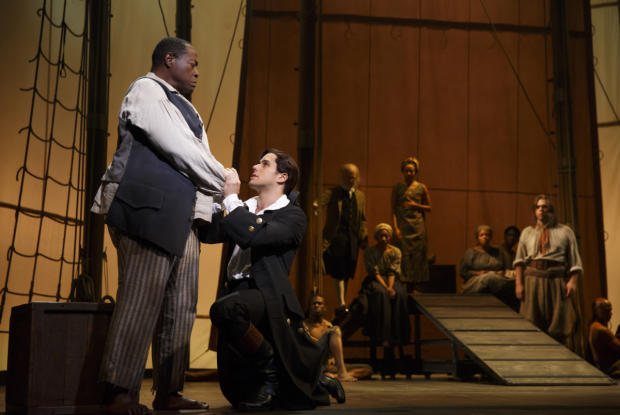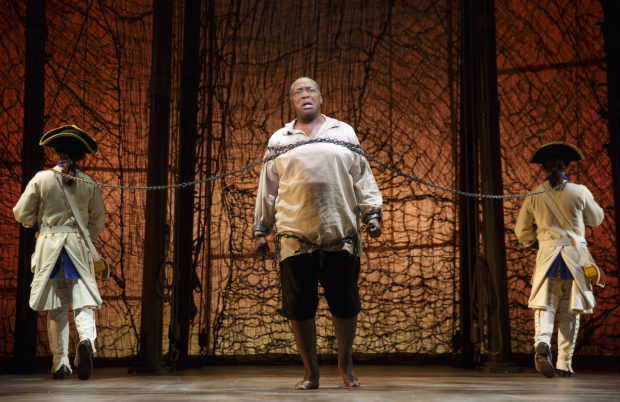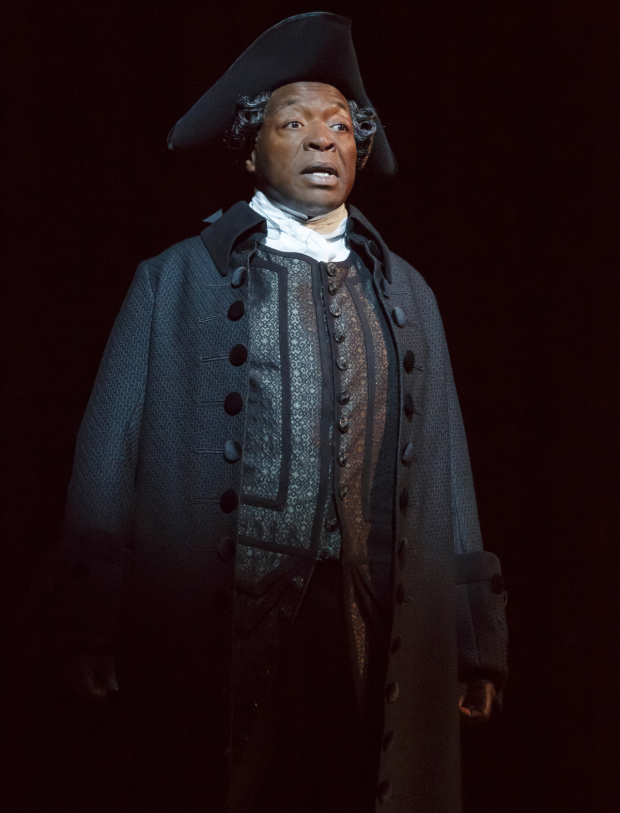Final Bow: As Amazing Grace Comes to a Close, Chuck Cooper Considers Its Emotional Ending
Though the new Broadway musical Amazing Grace enjoyed only a short run on the Great White Way, it left a lasting mark on the hearts of many of its audience members. In fact, the show, which tells the story of the reformed slave-trader who penned the iconic hymn of the title, boasts an ending that brings the audience to their feet even before its curtain-call ovation.
Undoubtedly, the phenomenon is due in part to the emotional story of hymn-writer John Newton's redemption — facilitated by the (possible) forgiveness of his former slave, played by Tony winner Chuck Cooper. But it's also a result of the near-universal emotional resonance of the song "Amazing Grace," which closes the musical. TheaterMania joined Cooper in looking back at the show's life, from rehearsals to a hit Chicago run to Broadway, as Cooper shared his thoughts on the Amazing Grace's moving ending, its critical response, and the complicated emotions of forgiveness.

(© Joan Marcus)
1. What is your favorite line that you deliver?
I guess that would be, "I can leave, but the peace is up to you."
2. Everyone loves inside jokes. What is the best one from your show?
In the second act of the show, Princess Peyai, who is the evil Sierra Leonean slave trader, begins a ritual in Sherbro (which is the language that she speaks) by saying "Ekon boon." So we have co-opted "Ekon boon" to mean a wide variety of things. I often come down the stairs singing the "Ekon Boon Blues": "Ekon boon me, baby," "Ekon boon me all night long." No one would understand it but us.
3. Every show experiences technical difficulties. What was the worst technical difficulty experienced during your show and how was it handled?
The [shipwreck] sequence at the end of the first act is the most technically difficult aspect of our show. It required hours and hours of rehearsal and then technical rehearsal. It has [only] messed up maybe twice in our run and oddly enough those two times were back to back. We had a computer challenge that took them a while to figure it out.
4. What was the most "interesting" present someone gave you at the stage door?
A friend of mine showed up one day with a Playbill from Amen Corner, which is my first Broadway show, which also happens to have been at the Nederlander Theatre where Amazing Grace is. So my friend who had this in his collection brought it to the stage door one day and [gave] it to me.
5. Who is the coolest person who came to see your show? (You can't say family!)
Judy Collins. ["Amazing Grace"] had almost fallen out of the library of American songs and she made a very famous recording of it, and it kind of brought it back to life.

(© Joan Marcus)
6. Other than "Amazing Grace," what do you find to be the most moving song in the show?
I love Laiona [Michelle]'s song, "Daybreak," and Erin [Mackey]'s song "I Still Believe."
7. Amazing Grace had a sold out pre-Broadway run in Chicago. Why do you think it was received differently when it was out of town?
New York critics are far more cynical and New York audiences are more sophisticated theatergoing audiences, so I think those are two big factors. There are flaws in this production that any practitioner or critic of the theater can readily see…but it doesn't negate the fact that many people came to see it and had a marvelous experience.
8. As an actor, how do you justify your character, Pakuteh, forgiving the John Newton character?
The journey to sculpting this scene was very difficult for me. [John Newton] says, "I'm sorry" [and I was] supposed to jump up and go hug him. Literally, hug him and forgive him. And I told them, "Oh, no no." It would be disrespectful, I believe, for it to be that easy. So what I hope that we have done is sculpt a moment that illustrates the difficulty that both men are having. John is having a very difficult moment changing his ways and Pakuteh is having a very difficult moment having anything to do with this person…What I hope is that we arrive at a moment where the possibility of forgiveness exists.
9. In rehearsals, were you anticipating that the audience would stand at the end of your show?
You know, that song is that song, so of course people are going to sing along with it. But let me tell you this, we had no idea how profoundly moved many people would be by the way in which we meet that song in our show.
10. What is the most moving story you heard from an audience member?
I've heard so many. One day I was out signing autographs and there was this little boy with his dad, and I asked him if he liked the show and he said, "Yeah." I asked him what he had learned from watching the show, and he couldn't really articulate anything. And I said, "Well that's OK, you don't need to know right now but think about it and when you come up with something, share it with your dad." Well, a week or so later I get an e-mail from the father and apparently the young boy had come back to the father and had shared what he learned from Amazing Grace, which was, and I'm paraphrasing: "That everybody is the same. That it doesn't matter what gender or race you are, that we should all be working toward making the planet a better and safer place for everyone." That's pretty darn cool.

(© Joan Marcus)










